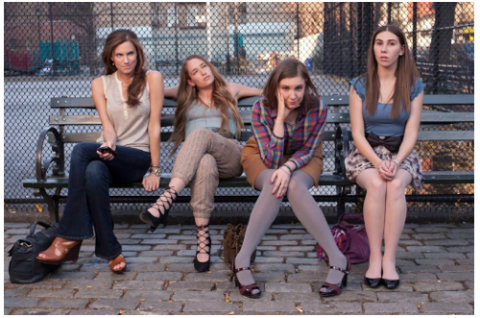Having switched up my new year reading list order, I took up Scarlett Thomas’s Oligarchy. Unfortunately, the thin book revealed a thin plot and the real issue at the heart of it all was harpooned and left to waste away.
The ripple effect
Why everyone should read 'The War On Women'
Women who know their place
Blurred lines
A varient on normal
A feminist because...
My cause and me
What am I to think?
Baffled
Popular culture can pack quite a personal punch
 I was recently rereading Bridget Jones' Diary (for the fourth time: yes, it's my guilty pleasure and I offer no apologies for it). I was enjoying March’s flirtatious back-and-forth with Daniel Cleaver, when I noticed a few passages that really dated the book. It made me wonder what heroine-led tale would encapsulate our present decade.Then it hit me: there are no leading women in the tales of popular culture any more, only girls.
I quickly complied a mental list of today’s leading literary ladies who could take Bridget’s place: Katniss Everdeen, Bella Swan and Ana Steele. I started to panic. These characters are all barely more than children, and need or want guidance and control from a man. Maybe TV could step in and calm my nerves. The Sex and the City of this generation turns out to be: Girls. No luck there. I was astounded. My identity had just been robbed of any cultural representation. It felt like I was suddenly invisible.
I was recently rereading Bridget Jones' Diary (for the fourth time: yes, it's my guilty pleasure and I offer no apologies for it). I was enjoying March’s flirtatious back-and-forth with Daniel Cleaver, when I noticed a few passages that really dated the book. It made me wonder what heroine-led tale would encapsulate our present decade.Then it hit me: there are no leading women in the tales of popular culture any more, only girls.
I quickly complied a mental list of today’s leading literary ladies who could take Bridget’s place: Katniss Everdeen, Bella Swan and Ana Steele. I started to panic. These characters are all barely more than children, and need or want guidance and control from a man. Maybe TV could step in and calm my nerves. The Sex and the City of this generation turns out to be: Girls. No luck there. I was astounded. My identity had just been robbed of any cultural representation. It felt like I was suddenly invisible.
As the week progressed, this thought continued to buzz through my brain like the electric cables that run through London’s Underground. Then I heard that the Pussy Riot verdict had been delivered. In the media storm that followed I stumbled across an article, which reported that the American press had avoided using the word ‘pussy’ in any print headlines.
Pussy Riot were making a statement, but in the land of the free the very identity from which they spoke had to be censored. I heaved a tired sigh. I was too sad to be angry. The buzzing fell silent and I felt a little less sure of myself.
As it turned out, my mind did not stay quiet for long. This bruising week ended as I watched Green Day’s new music video for ‘Oh Love’. I already liked the song and I watched with smiling anticipation. As it played my gaze gradually hardened. What appeared before me was a hyper-sexualized, hackneyed objectification of a group of (very) young women.
[youtube http://www.youtube.com/watch?v=IWwMqa-_210?rel=0]
One of my favourite bands, a band that had previously earned the descriptives of alternative, punk, and rebellious had undermined all that they stood for by making women passive targets. Their lead singer, Bille-Joe, stated that the song is about "shooting a little bit more from the crotch area". I wanted to track him down and scream: “but Billie-Joe, I have a crotch too, and I can shoot just as well as you.”
That week drew to a close and my encounters with these little pieces of popular culture coalesced around a much bigger idea. I had woken up to find that popular culture is not waging a war against women: it’s admonishing unruly little girls, who can’t fight back. But I’m not a little girl.
It’s time to grow up.



